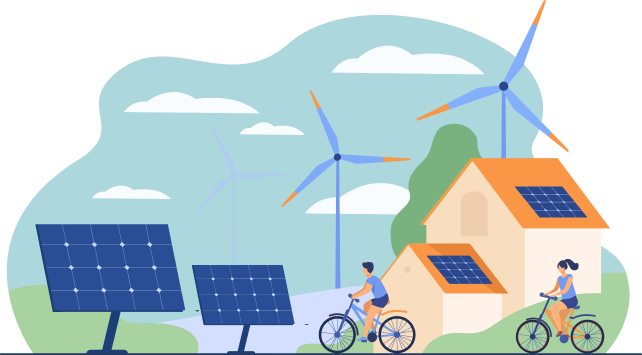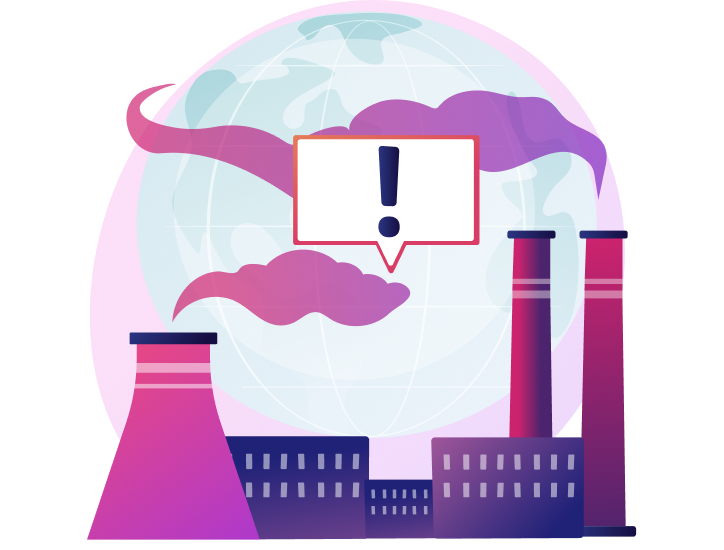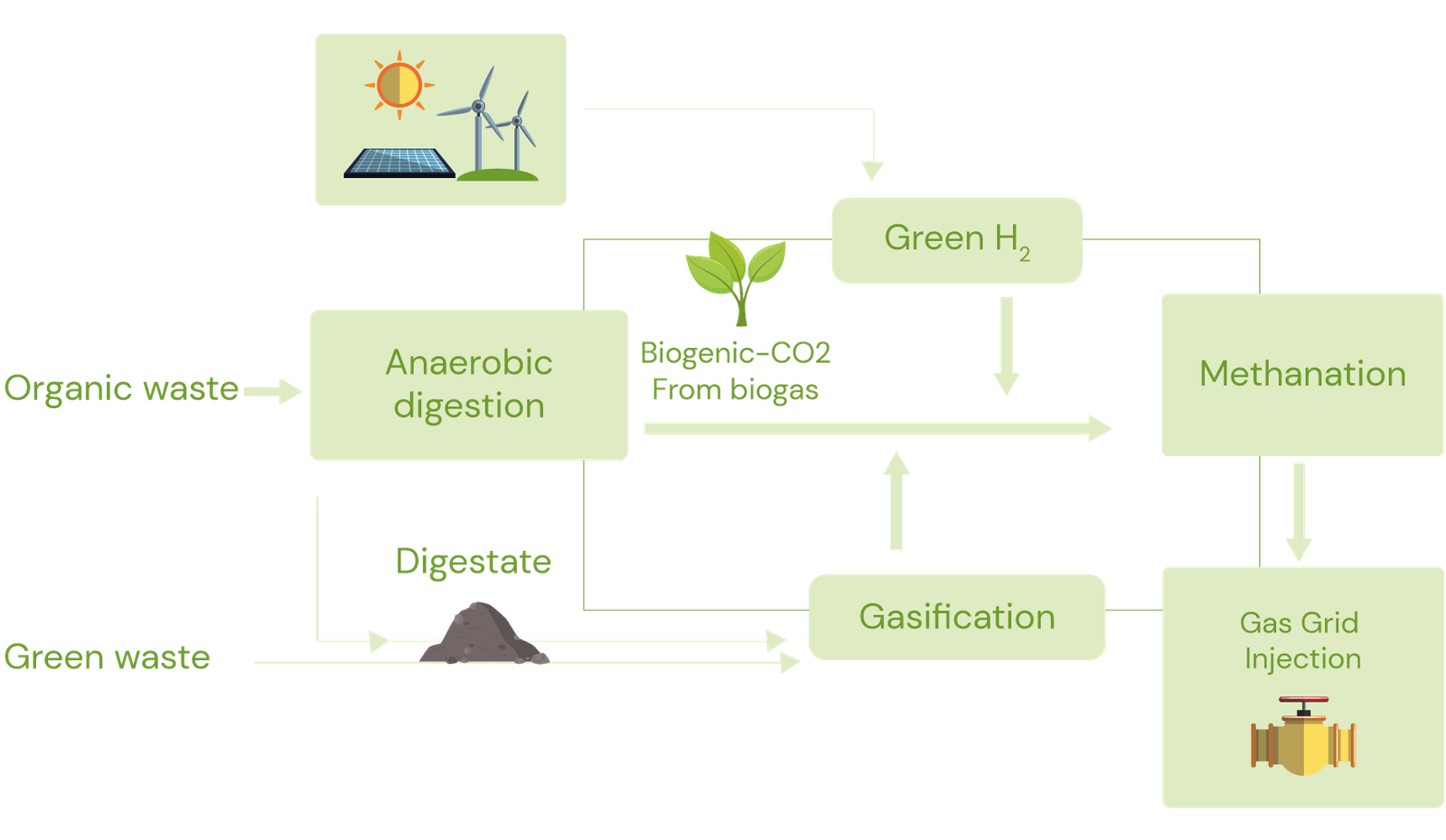A EUROPEAN AMBITION
The European Commission has recently confirmed that nuclear and natural gas should be considered as transitional energy to reach European climate and energy targets. The EU taxonomy recently claimed the role of nuclear and natural gas projects to reach these goals . This decision has been strongly criticized, especially regarding the support to natural gas which is a fossil energy source whose direct emissions intensity still reaches 200 to 250 gCO2/kWh and around 450 gCO2,eq/kWh as overall carbon intensity. Biomethane and other bio synthetic natural gas (bio-SNG) offer lower carbon footprint and boost domestic energy supply for Europe. Yet current biomethane production processes offer limited potential to meet gas demand without putting stress on land use competition between energy crops and food production for instance. Therefore, new production processes need to be explored, investigated, demonstrated and upscaled to contribute efficiently and effectively to the decarbonisation and independence of the European gas sector and more widely of the European Union economy.
METHAREN MAIN OBJECTIVE
The main objective of METHAREN is to demonstrate a cost-effective, innovative, more sustainable and circular biomethane production system enabling renewable energy sources (RES) intermittency management. The project will demonstrate the cost-effectiveness and sustainability of the whole production chain from feedstock to injection of methane into the grid.

Optimizing Biomethane Production.
Optimise biomethane production through the extraction of value from biogenic-CO2 and discarded residues to increase by 150% the overall production capacity of biomethane while reducing the overall production costs. The first objective of METHAREN is to significantly increase the cost-effectiveness of biomethane production on existing biogas plant sites. This innovative process demonstrated in the project represents a promising way to “diversify the conversion technology basis for biomethane production” enabling an increase of the overall yield conversion into biomethane. The system will valorise biogenic-CO2 currently released to the atmosphere and especially so far discarded waste residues. More than an increase of the production, this process therefore expects to reduce overall cost of the production by 20% through this valorisation to reach a more affordable biomethane, proving the cost-effectiveness of the system.


Transforming Biomethane into a Flexible Renewable Energy Carrier.
Demonstrate the system efficiency to manage the RES intermittency by transforming continuously any electron in biomethane as a flexible renewable energy carrier, minimising use of electric storage devices. The solution developed in METHAREN has further ambition than increase the biomethane production. It aims at fully exploit the potential of biomethane as an energy carrier. The project will develop the flexibility of biomethane as an energy carrier which can directly be fed into the existing gas grid. This system will provide such intermittency management with very limited or rather no energy storage devices. It will directly bridge the renewables production to the gas grid maximising the efficiency of the conversion.
Maximizing Circular and Sustainable Biomethane Production with Reduced GHG Emissions.
Enhance circularity and sustainability with heat recovery and power integration playing a great role in the system with different process intensification schemes representing a significant innovation and contributing to minimize overall energy consumption.


Developing an Optimized Biomethane Production System with Market Potential.
Develop an integrated and optimized biomethane production system with a strong market uptake and upscaling potential. METHAREN plans to demonstrate an innovative system relying on its integration facing different technological challenges. The project will give the last keys and elements to foresee a large upscaling to an industrial system, thoroughly designed at the end of the project. The developed technologies and their integration will prove their relevance to efficiently produce biomethane at scale, unlocking new feedstock sources through gasification to enhance the biomethane production potential at European scale. More than this technical feasibility, the project will therefore prove its economic potential. The careful analysis of the project results will lead to define the market for the technological innovations but also business models for their exploitation and for the biogas plant to be equipped with such system as well.
Towards Achieving EU Climate and Energy Goals: Increasing SNG Production with RES Integration.
Contribute to reach European targets and goals for energy and climate through the increase of SNG production while facilitating RES integration. METHAREN is well in line with the EU strategy to overcome two main issues: to cut its domestic GHG emissions by at least 40% below 1990 levels by 2030 and foresee to reach climate neutrality by 2050 as reaffirmed in the European Green Deal. It will contribute to demonstrate the feasibility of efficient conversion from renewable energies into biomethane which represents a complete solution. Indeed, it plays the role both of bioenergy carrier for intermittency management, and a biofuel for the transport sector for example.

METHAREN CONCEPT
The consortium will use the results of the engineering specifications to develop the technologies related to the gasification plant, the methanation plant and the development of the circularity in the various processes.

METHAREN ACTIVITIES
Comprehensive breakdown of project activities across nine Work Packages (WP)
WP1 - Specification and basic engineering of the biomethane production system.
The aim of this WP is to define the target specifications for the integrated system as well as to identify the technical or regulatory constraints. At the end of WP1, all partners will agree on the requirements and specifications for the development and integration of the whole system, feeding the other WPs with the results.
The aim of this WP is to define the target specifications for the integrated system as well as to identify the technical or regulatory constraints. At the end of WP1, all partners will agree on the requirements and specifications for the development and integration of the whole system, feeding the other WPs with the results.
WP2 - Development of the gasification plant.
WP2 aims to develop and provide the detailed design of the pilot gasification plant to be implemented on the ACEA’s site, based on the specifications established in WP1. The interest of HTC integration will also be investigated, for comparison and future enhancement of the project plant..
WP3 - Development of the methanation plant.
The objective of WP3 is to develop and provide the detailed design of the methanation plant to be implemented on the ACEA’s site, based on the specifications established in WP1.
WP4 - Circularity and intermittency management.
The objective of WP4 is to provide the control software for circularity and intermittency management of the final METHAREN system, based on the specifications established in WP1. Heat and water circularity will notably be investigated, while the Energy Management System (EMS) and SOEC optimisation software developed.
WP5 - Integration and implementation in the demonstration site.
This WP aims to detailed, procure, and install all equipment for the implementation of the full biomethane production system, in close relation with WP2-3-4. It will check, test, and verify all bricks of the system towards installation, commissioning, and start-up in ACEA pilot site.
WP6 - Operation, monitoring, and analysis of the pilot.
During WP6, the performance and cost-effectiveness of the full METHAREN system will be investigated under various operating conditions following the protocol established in WP5. All relevant parameters will be registered and the power supply, biomethane production and important performance indicators will be systematically evaluated. Finally, the analysis of these results will lead to an optimisation strategy on the different components, while the technoeconomic and social/environmental life cycle assessments will study the potential for industrialisation and replication of the project solutions in a near future.
WP7 - Market uptake of the biomethane production system and exploitation.
This WP will investigate the scale-up of the pilot system, analysing the potential limits of obstacles towards replications, studying the market opportunities for the METHAREN technologies, engaging an Industrial Cluster Board to increase the industrial bloom of the project, and raising awareness of future users and policymakers of the environmental, economic, and social benefits of METHAREN technologies..
WP8 - Communication, dissemination and networking activities.
The WP8 gathers all the communication, dissemination, and intellectual property activities of the METHAREN project. Communication and dissemination are essential aspects to ensure the success of the project, which aims at a final industrial exploitation of its results
WP9 - Project management and ethics.
The aim of WP9 is to ensure timely completion of all objectives, milestones, and deliverables to ensure proper reporting to the European Commission. Therefore, this WP will also ensure efficient coordination and data harvesting between partners.
